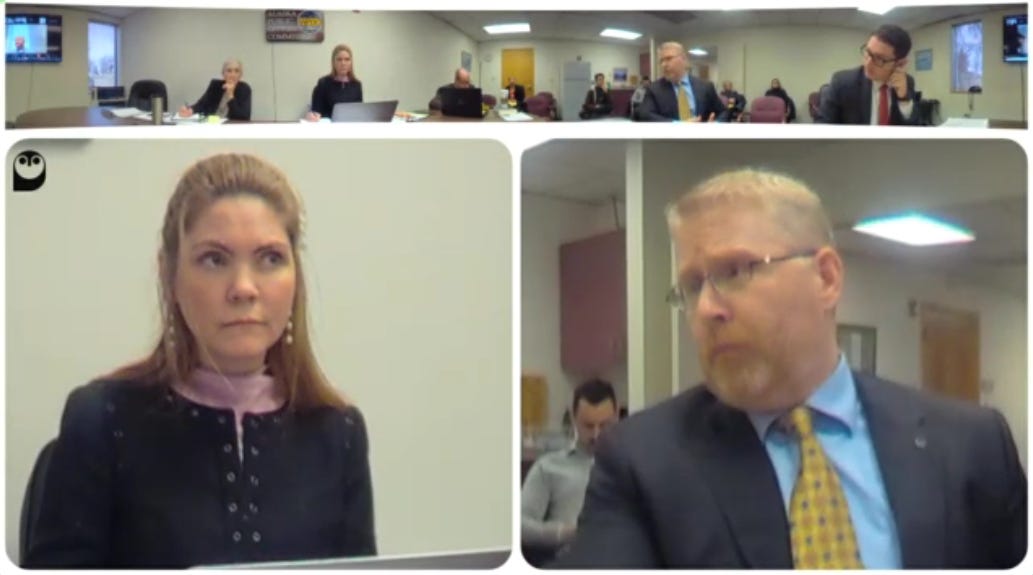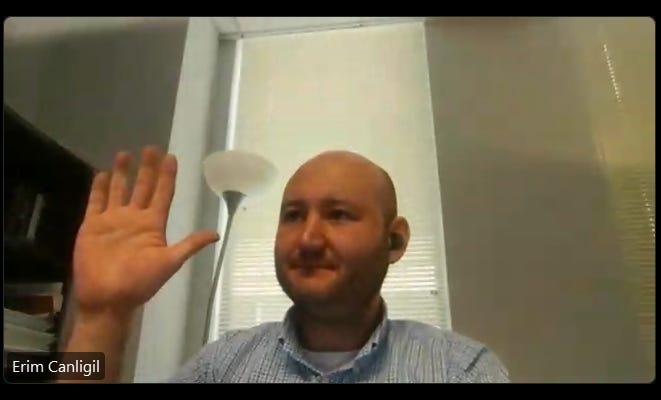A brazen election scheme or clever new loophole? APOC hears latest battle over pro-Dunleavy group
It seems like it will very much hinge on whatever legal technicality separates what may be one of the most brazen violations of election finance law in recent memory and a clever new loophole.
Happy Friday, Alaska!
In this edition: A long day in front of APOC gave us a really interesting look into the mechanics of the dark money groups behind all those cookie-cutter mailers and ads that bombard Alaska every year. The complaint looks like it’ll boil down to whether the activity is illegal or just looks like it’s illegal, you know as most things when it comes to money and politics nowadays.
Current mood: 🍳
A Super PAC by any other name

Let’s be honest with ourselves. There’s a lot about the intersection of money and politics that operates somewhere between a wink and a nod. It’s a system that seems, by design, capable of catching the most obvious violations while leaving campaigns to throw the challenge flag on each other. It’s a problem that seems exacerbated by the ever-growing gulf between what seems illegal and what is illegal. And as seems to be the case these days, there seems plenty of people willing to push the rules. We’ve got a laundry list of fishy sole sourced contracts and cushy jobs to the dangerously unqualified that, if put to the legal test, could very well stand up as fishy but not illegal. Maybe someone would have to take an ethics class following the ruling, some cases might spur new laws and most big-ticket fines will be the cost of doing business.
Anyway, that’s all to preface the latest campaign finance allegations in front of the Alaska Public Offices Commission today, which seems like it will very much hinge on whatever legal technicality separates what may be one of the biggest and most brazen violations of election finance law in recent memory and a clever new loophole.
The complaint alleges the Republican Governors Association—a conservative dark money group whose board of directors are quite literally the Republican governors—has so thoroughly pushed the limits of Alaska independent expenditure law that a pro-Gov. Mike Dunleavy group it created should be ordered to stop spending money.
The complaint was brought by two public interest litigant groups and represented by the pugnacious Scott Kendall, an attorney who has frequently found himself on the opposite side of Dunleavy-centric legal cases. Today, he argued to the board of APOC commissioners that a collection tax and banking documents show the group wasn’t being truthful on the disclosure statements that independent expenditure group A Stronger Alaska has been filing since its formation in February 2021.
“The RGA is asking the commission to do something remarkable. They’re asking them to say, ‘It’s perfectly sound, legally OK and completely honest with the Alaskan people if the RGA can say to the IRS, ‘This is our money, we never gave it up, it’s ours, we control it, we move it and then say to APOC—and by extension, the Alaska people—no, this is ASA’s money. RGA is just a donor on our disclaimer, and they don’t control anything,’” he said. “We heard today they’re controlled today by the two lead officers of the RGA, unilaterally.”
Those two officers would be RGA Executive Director Dave Rexrode, who is the chair of ASA, and RGA CFO Erim Canligil, who is the treasurer for ASA. Based on their testimony today—which provided an interesting window into the world of these big-money dark money political groups that I’ll write more about when it’s not 6:30 p.m. on a Friday night—the two groups share the same staff, same phone number, same location, consultants and even the same employee identification number, which means in the eyes of the IRS they are literally the same entity.
It’s that last point along with banking documents, which show the Republican Governors Association’s name on ASA’s bank account, that Kendall says proves the two groups are the same.
That last point would also explain why the IRS filings of the RGA show direct payments to an Alaska-based consultant, polling and other campaigning—which have been reported by ASA as if they were their own contributions—and why those filings don’t reference the $3 million contribution. It was an internal transfer between two accounts under RGA’s umbrella, never leaving the control of RGA.
In a particularly important line of questioning with Canligil, Kendall asked what would happen to access of the bank account if one of them left the ASA campaign. Could they still access it? Canligil said he wasn’t entirely sure, but it seemed that they would both have maintained access through their position with the RGA. He also said he wasn’t sure what would happen if ASA spent money contrary to the wishes of the RGA because, after all, they’re members of both. Canligil added he likely wouldn’t have known about the Alaska group or been involved if not for working with the RGA.
APOC Commissioners were keen on this point, with a majority asking several questions about the internal policies of both groups to understand just how separate they really were.
“I’m trying to make sure that the ASA is more than just a name,” Commissioner Lynette Blodgett said at one point.
Attorneys for the RGA and ASA argue that groups should considered legally distinct in the eyes of APOC, even if most other government agencies would see them as one and the same. While the groups share the same IRS tax identification number, ASA Attorney Richard Moses told APOC commissioners that its filings with APOC are all that should matter.
“You do not have a statute or a regulation that requires them to be registered with the requires them to be registered with the Department of Commerce, Community and Economic Development,” he said, reiterating that they had set up their own bank account (with the RGA’s name on it).
Kendall asked the commission to consider halting the group’s actions but said it wouldn’t stop spending altogether.
When asked what remedy the RGA would have if they were to close the independent expenditure group, Kendall noted they could simply refund the money, create a new group that is actually distinct with its own EIN—as every previous RGA-funded campaign in Alaska has done—and recontribute the money. Of course, that would also trigger the state’s dark money rules and require the Republican Governors Association to disclose the true source of the $3 million being spent in Alaska.
Moses said this would be a great affront to the people who donated the money. As he said previously, when the group made the contribution just days before the state’s disclosure laws it was legal at the time. He said the donors would be harmed.
“They want to dox whoever gave the $3 million to the RGA in the first place. You don’t have the authority to do that,” he told commissioners, “But that’s what they’re asking you to do.”
For their part, the Alaska Public Offices Commission commissioners focused on a few key issues that will likely be the basis of whatever action they may or may not take. First was the issue of just how independent the two groups really are from each other. Secondly, and this is what my preface is about, they’re looking for what laws were actually broken here and whether they have the authority to act on it at all.
Kendall gave a list of six specific legal concerns:
That the filings of ASA as an independent expenditure group were not truthful
That the Republican Governors Association is acting as an unregistered independent expenditure group outside of the state’s campaign finance system
Every expenditure report made by ASA is false because, according to IRS filings, all expenses have been made by RGA, not ASA, and should be reported as such
False disclosures that went out on a statewide mailer that apparently cost $300,000
That RGA’s unregistered contributions should be subject to dark money disclosures.
That the name “A Stronger Alaska” is inaccurate because state law requires any group that’s principally focused on supporting or opposing must be included in the name. This provision kicks in when a third of the money is dedicated.
Both attorneys for RGA and ASA claimed that Kendall never made a specific allegation against them because he didn’t list specific laws. Kendall had, in fact, offered the specific citations to state law and regulation but APOC chair Anne Helzer said it wasn’t needed because it’s already in the filings.
Following the day’s hearing. Commissioners went into executive session and Chair Helzer said a written decision is expected to be released on Monday.
Stay tuned.
Weekend watching
A few people asked me about where they could watch Alaska U.S. Rep. Mary Peltola’s address to the Alaska Federation of Natives on Thursday. Here it is!
Take care and have a nice weekend.





Thank you Lisa, Don Young's daughters and the AFN! Matt.. I love your blog... but I also look forward to see what your mood of the day is!! :D